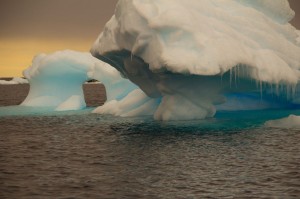
Burch Fellow and filmmaker Pablo Durana was on the production crew for the Oscar-winning film, “Inocente.” (photo courtesy of Pablo Durana)
Twenty years ago alumnus Lucius E. Burch III and then Associate Dean for Honors Robert C. Allen met at the Carolina Coffee Shop on East Franklin Street. From that very ordinary get-together came something very extraordinary.
By the time they finished their coffee and conversation the outline for the Burch Fellowships, an unprecedented opportunity for UNC undergraduates, had been drawn. The seed planted in 1993 has blossomed into scholarship nurtured by imagination and independence, adaptability and accountability, all hallmarks of a successful life, says Burch.
Burch ’63, of Tennessee, had been asked to invest in his alma mater by joining the Chancellor’s Clubs. But, as befits a venture capitalist, he was thinking bigger. “I told Bobby I wanted to do something more significant, something that would make more of a difference,” he recalls. He was also thinking about his own days in the College of Arts and Sciences when the most powerful learning experience he had was not in a classroom but during a summer break in Alaska.
So it came to be that Allen had an initial gift from Burch and the responsibility for shepherding development of the Burch Fellows Program, which would enable undergraduates across the University with exceptional abilities and interests to design potentially life-transforming experiences. The first two fellowships were awarded in 1994 and included the study of traditional Chinese medicine. Since then students have pursued passion for subjects as diverse as theater-for-development in Malawi, labor rights for self-employed women in India and climate modeling in Norway.
In 1999 Burch would also become the benefactor of the Burch Field Research Seminars. These enable faculty to take small groups of selected undergraduates to places around the world for learning experiences that are both academic and experiential. Seminar topics have ranged from alternative energy in Iceland to post-Cold War security in Eastern Europe to public health in Vietnam.
Friederike Seeger, director of Burch Programs and Honors Study Abroad, explained that a small committee comprised of UNC faculty and staff selects five to seven applicants as Burch Fellows from the 40 to 60 applications submitted annually. Fellows receive up to $6,000 each to help them finance their learning projects. Over the past two decades there have been 100 Burch Fellows.
“It’s not about dreaming up wonderful things for students to do but instead investing in students’ creativity and aspirations and ambition,” said James Leloudis, current associate dean for UNC’s Honors Program.
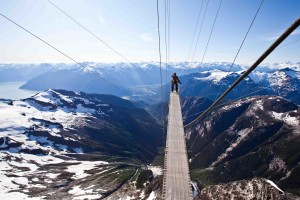
Pablo Durana at Mount Bute in British Columbia working on a National Geographic documentary. (photo courtesy of Pablo Durana)
The filmmaker
By the age of three Pablo Durana was multi-national and multi-lingual thanks to the careers of his parents, yet it was a later trip to Chapel Hill to visit his older brother Camilo, a Morehead Scholar, that would change the course of his life. Durana ’06 quickly “fell in love with the campus and great environment” and decided he too wanted to attend UNC. It was his adviser in the department of communications studies who suggested he look into the Burch Fellows Program. So it was that the cross country and track standout who’d always had an affinity for “lore and storytelling … and the experience of different cultures” applied for and received a fellowship in 2004.
Durana’s plan was to bicycle through western China, experiencing and documenting the lives of as many of the region’s 56 minority populations as possible. He would film the journey, and his companion on the four-month, 2,700-mile trek would be his equally athletic older sister Maria. She, a McGill University graduate who’d secured her own funding for the undertaking, would take still photographs.
And why cycling when so much additional equipment was required?
“Bicycles give you access to places buses and cars can’t go. You get to the in-between places most others overlook, and you find out that people are happy to share their lives and stories with you,” said Durana.
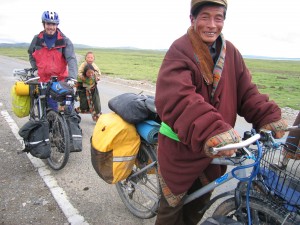
Durana bicycled across China to document ethnic minority groups for his Burch Fellowship. (photo courtesy of Pablo Durana)
The China experience convinced Durana that his life should be devoted to exploration and storytelling via filmmaking. It also taught him how much more he needed to learn about the art of filmmaking, as editing 20 hours of video down to five minutes for his final Burch Fellows report was challenging, to say the least. The following summer, he landed an internship with National Geographic in Washington, D.C. based in large part on the strength of the work done as part of the Burch program. There he met people who knew people and the rest, as the saying goes, is history. Today, Durana, 30, is a successful freelance cameraman, cinematographer and sound recordist whose assignments range from covering the drug wars in Juarez, Mexico, one month to the creation of a documentary on the discovery of ancient Mayan tombs in Guatemala the next. He was on the production crew for Inocente, which won an Oscar this year for best documentary short.
The discipline and time management used by Durana in his daily living is what Lucius Burch envisioned when he created the fellowships 20 years ago. Every April, the most recent fellows attend a Burch Fellows dinner in Chapel Hill where they share their stories. Burch is almost always in attendance and he reiterates the five features of the off-campus learning experience: Conceive a project, plan a project, pitch the project, execute the project and report on the project.
“His language comes out of his career as a venture capitalist but it also embraces and champions, in a succinct way, the core of a liberal arts education,” said Leloudis.
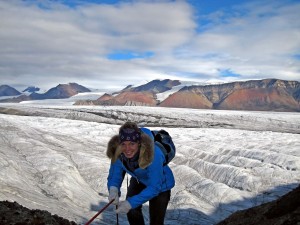
Zena Cardman’s Burch Fellowship funded astrobiology research in British Columbia and the Canadian Arctic. (photo courtesy of Zena Cardman)
The scientist
As an undergraduate studying biology and unschooled in the ways of fellowships and grants, Zena Cardman ’10 found “the Burch process of conceiving a plan and then orally defending the proposal terrifying.” Yet so strong was the desire of the daughter of a nuclear physicist and librarian to be part of a research team headed to British Columbia and the Canadian Arctic that she persisted despite her fear. Good thing, because her 2008 Burch Fellowship for “Mars on Earth: Astrobiology in Pavilion Lake and the Arctic” helped her fund the expedition to Canada. It was a project with which she stayed associated for several more years, thus helping her grow the skills she now uses when seeking grants for the work associated with the completion of her master of science degree from UNC in marine microbial ecology.
Explaining the what, why and how of astrobiology — and, further, its link to marine science — is not the easiest of tasks. But 25-year old Cardman, whose life trajectory was greatly influenced by a high school biology teacher in her home state of Virginia, gave it a good first go in the quest for Burch Fellow status. Simply put, astrobiology is the study of the origin, evolution and distribution of life in the universe.
“A lot of people draw the analogy to oceans being ‘inner space.’ And ancient life forms, whether they’re in space or the depths of the ocean, greatly interest me since one informs the other and they are what will, ultimately, point us to the future,” she says.
Just the cataloguing of the microorganisms found in the deep sea excites Cardman because that process furthers understanding of their carbon and energy sources and other conditions surrounding life, and it is these things that have the potential for applications in fields as diverse as medicine and energy.
“Right now I use the ocean as a sandbox, of sorts, in order to draw analogies between what is and what if,” said Cardman, who spent a portion of last summer in the Gulf of Mexico on a research vessel that was tracking the direct effects of the 2010 Deepwater Horizon oil spill. She added, “What I’ve learned in the classrooms at Carolina and what I learned as a result of the Burch Fellowship have helped make me a scientific Swiss Army knife, of sorts. I can now do a lot of things, including writing about, videographing and photographing these beautiful but remote environments, and explaining why we should want to understand them. That’s a payload that is worth my weight.”
“The array of projects the undergraduates come up with is great, but what all those ideas require is great imagination. It’s the ability to imagine something and then make it happen that is so remarkable,” said Seeger, who’s now in her ninth year of providing guidance to Burch Fellows.
The storyteller and peacemaker
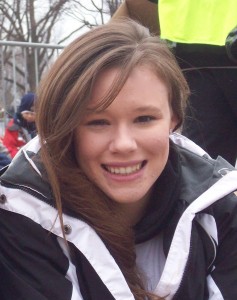
Taylor Jo Isenberg collected stories of the Domari community, “gypsies of the Middle East,” in East Jerusalem. (photo courtesy of Taylor Jo Isenberg)
Taylor Jo Isenberg, who grew up in two small towns just north of Charlotte and double-majored in peace, war and defense and international studies, is a self-described “double-dipping Burch person.” And gratefully so, for it was the Burch programs that proved integral to the goal she set not long after arriving at Carolina: Seeing and understanding the world through multiple lenses, including conflict points.
During her sophomore year, Isenberg ’10 spent a semester in Washington, D.C., as an intern for the Association for Diplomatic Studies and Training. Part of her work involved taking the oral histories of foreign service officers as well as members of the provincial reconstruction teams in war-torn Iraq. A primary purpose of collecting these stories was to preserve knowledge that could help inform future international dealings. Upon returning to Chapel Hill and reading the “phenomenal stories” of past Burch Fellows, Isenberg decided to craft a proposal for a fellowship that would build on her experience with the power of oral histories and on the time she’d devoted to Arabic studies and language at the American University in Cairo.
The project, “The In Between: The Dom of East Jerusalem,” centered on collecting and telling the stories of the Domari (“Dom” for short), gypsies of the Middle East, who’ve lived in a no-man’s land for over 400 years. Neither Arab-Palestinian or Jewish-Israeli, “the economically, socially and culturally marginalized Domari are a community stubbornly disengaged from the political situations, yet continually disturbed and formed by the unique status of Jerusalem,” said Isenberg, now 25 years old.
Her time in Israel happened the summer between her junior and senior years. In the report of her experience, she wrote, “Jerusalem was trying: there was emotional upheaval, frustration and failure. But there was also clarity, understanding and daily triumphs that demonstrated the infinite potential of determination.” Earlier, Isenberg had participated in a Burch Field Research Seminar in Washington, D.C., focusing on public policy. Knowing what doesn’t suit is as important as knowing what does. While she came to understand the benefits of macro-level policy, Isenberg kept returning to the lessons learned in Jerusalem. She recognized her life’s work would play out at the grassroots level: creating peace through building communities and encouraging non-violent political engagement.
It was Isenberg’s volunteerism for the Roosevelt Institute at UNC that would ultimately lead to her full-time employment as national director of the New York-based institute’s campus network, which has 110 chapters in 37 states. “We challenge college students to engage with the world in a new way, to ask questions and to help build stronger democratic processes,” she explained.
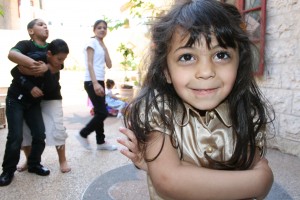
Children play in the afterschool program of the Domari Society of Gypsies. (photo courtesy of Taylor Jo Isenberg)
“When I was at Carolina I was asked, ‘What are you going to do and how are you going to do it?’ I learned it’s OK to be comfortable with discomfort, that learning can happen in many ways and you’re only limited by your creativity. It’s such a terrific model for living and one I try to pass on,” added Isenberg.
It’s also a model that has since been copied by other schools, and it’s something Lucius Burch would like to see expanded at UNC-Chapel Hill.
“Frankly, most people think too small,” he said. “The Burch Fellows program is about moxie, about making dreams real. When you have the imagination and discipline required for that, then you’ve opened a world of opportunities for yourself and others — and the long-term implications of that are extraordinary.”
[ By Lisa H. Towle]

